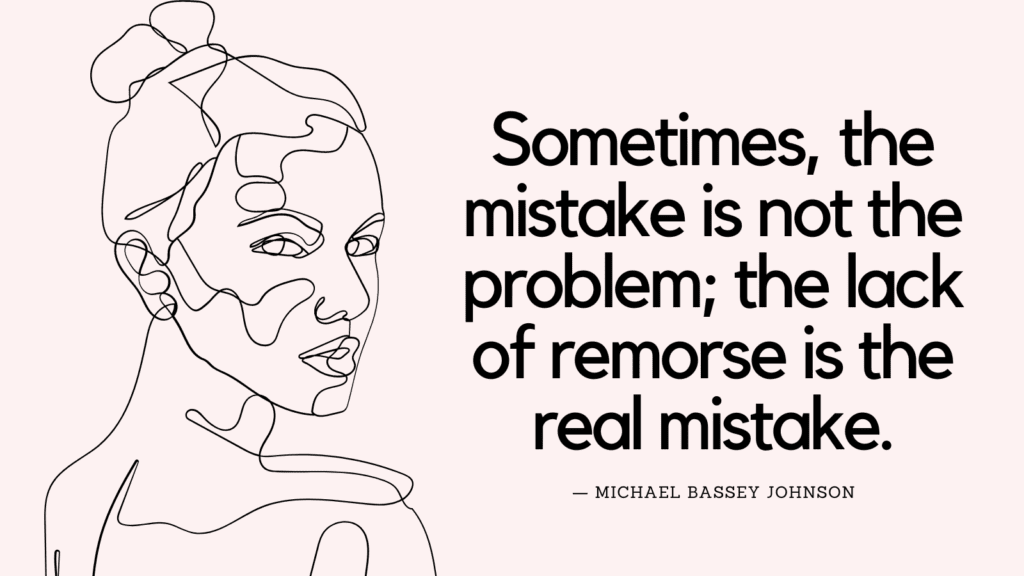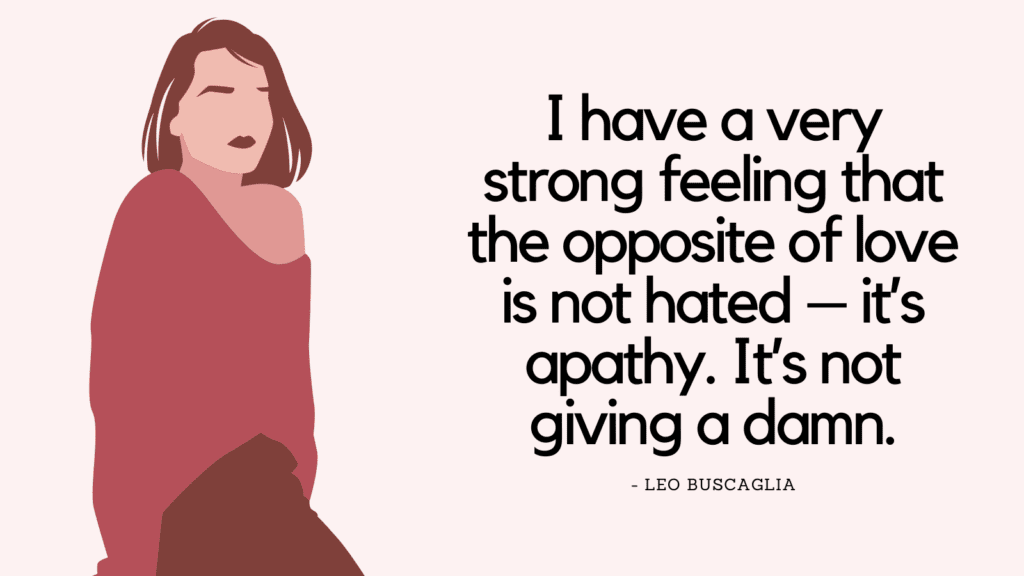This post contains some of the best quotes about remorse.
What Is Remorse?
Remorse is a complex emotional response that involves feelings of deep regret, sorrow, and guilt for something one has done or failed to do.
It is often accompanied by a sense of responsibility, self-blame, and a desire to make amends or seek forgiveness.
Remorse typically emerges when a person recognizes that their actions have caused harm or had negative consequences for themselves or others.
Remorse is seen as an important aspect of moral development and conscience.
It reflects an individual’s capacity for empathy, moral reasoning, and the ability to recognize the impact of their behavior on others.
Remorse can serve as a motivating factor to learn from past mistakes, grow, and make positive changes in one’s behavior.
Quotes About Remorse
1. “Chronic remorse, as all the moralists are agreed, is a most undesirable sentiment. If you have behaved badly, repent, make what amends you can and address yourself to the task of behaving better next time. On no account brood over your wrongdoing. Rolling in the muck is not the best way of getting clean.” ― Aldous Huxley
2. “And no, it wasn’t shame I now felt, or guilt, but something rarer in my life and stronger than both: remorse. A feeling which is more complicated, curdled, and primeval. Whose chief characteristic is that nothing can be done about it: too much time has passed, too much damage has been done, for amends to be made.” ― Julian Barnes
Related: Remorse vs Regret: What’s the Difference?
3. “Regret and remorse” is a dialectic issue about what has been done, about what should have been done and about what should not have been done.” ― Erik Pevernagie
4. “The skeletons of the past must not hold back the dream of a new life, even though fear and regret, guilt and remorse may unsettle us during the effort to give our future a new home.” ― Erik Pevernagie
5. “So what is a psychopath? How about a narcissist or a sociopath? They’re manipulative people—completely devoid of empathy—who intentionally cause harm to others without any sense of remorse or responsibility.” – Jackson MacKenzie
6. “Intentionally and remorselessly harming someone else is what makes an abuser.” – Jackson MacKenzie
7. “The feeling was so much worse than regret, which was just a nagging thought in the brain. Remorse was having your insides replaced by worms.” ― Samantha Downing
8. “Sometimes, the mistake is not the problem; the lack of remorse is the real mistake.” ― Michael Bassey Johnson
Related: Toxic Shame Quiz
9. “Past remorse becomes motivating fire.” ― Dean H. Wild
10. “Humans, we survive differently. We numb those empty feelings, we revert to anger and hatred. We block out remorse because we no longer want to care. It’s an escape of some sort, to hide the long periods of trying to deal with the bouts of bullshit in the right way. We betray ourselves, we lose our values, and worse, we forget who we are.” ― Arti Manani
11. “Real remorse can’t be choreographed.” ― Melanie A. Smith
12. “Revenge is hollow and insatiable. It never satisfies; it never heals. It leaves us remorseful or hungry for more.” ― Wayne Gerard Trotman
13. “The ‘need to know others’ is the beginning of world peace. Remorse is the path to wisdom. Honest friends are the result of wisdom” ― Rian Mileti
14. “Reflection offers a retrospective exploration, a way to figure out how everything fits and connects now on your journey- and being done so without regret or remorse. Reflection is the birthplace of discernment, an insightful and awakening place that grants you to keep what you need and smartly sift away the rest.” ― Christine Evangelou
15. “Uncertainty is an excruciating state in which to exist. A moral question that never appeared in my study continues to claim prominence in my mind: Is it possible to look someone you love in the eye and tell a lie without experiencing remorse?” ― Greer Hendricks & Sarah Pekkanen
Related: Top 35 Shame Quotes
16. “Accountability is not just about being or feeling sorry— it is about a set of actions that demonstrate remorse in practice. And it is not the feeling of remorse that delivers us from our shame— it is the practice of accountability in action. It is doing sorry.” ― Danielle Sered
17. “Remorse! Can a heart like mine ever know the meaning of such a feeling? The habit of evildoing expunged it long ago from my calloused soul.” ― Marquis de Sade
18. “Wiersbe suggests that a distinction can be made between regret, remorse and repentance. Regret is that activity of the mind (intellect) that causes us to say, “Why did I do that?” Remorse touches us a little deeper causing us to feel disgust and pain (involving both the intellect and the heart), but not causing us to change our ways. True repentance brings in the third aspect of our minds – our will. To truly repent one must have a change of will. “Godly sorrow” is the catalyst that brings us to true repentance.” – Carey Dillinger
19. “In a moment of unusual clarity, we eliminate suffering by not wishing for a different life. When we affirm every manifold of our life, we begin to experience the first ray of personal illumination and commence trending on a road of living without regrets and remorse.” ― Kilroy J. Oldster
20. “The best you can hope for is a little peace and not too much remorse. Thoughts at peace under an English heaven.” ― Iris Murdoch
21. “What a difference between people! One person feels guilty about stepping on an ant while another remorselessly murders millions .” ― Marty Rubin
Related: Top 10 Signs Of Toxic Shame In A Person (+Best 20 Healing Shame Exercises)
22. “I need to confront my loss, not run away from it. I wanted to wade in with my eyes open and all my senses alert. I wanted to register everything, from the giant waves of sorrow to the inkiest ripples of remorse. I didn’t want to miss any of it.” ― alex George
23. “Remorse is not for the elderly. When it comes to them it is not purging or uplifting, but merely degrading and wretched, like a bladder disease.” ― Christopher Isherwood
24. “…it’s better to wake up amid the pangs of desire than amid those of remorse.” ― Amin Maalouf
25. “Time was imperfect, but if redirected to positive ends, it would mend some remorse.” ― Ken Goldstein
Related: How To Break The Cycle Of Abuse? Top 10 Powerful Strategies To Stop Being An Abusive Person

How to Deal With Feelings of Remorse?
1. Acknowledge and accept your emotions: Recognize and validate your feelings of remorse rather than suppressing or denying them. Allow yourself to experience and process the emotions fully.
2. Take responsibility: Accept accountability for your actions and acknowledge the harm caused. This can involve offering a sincere apology to those affected.
3. Learn and grow: Reflect on the underlying factors that led to the regretful actions and identify how to prevent similar situations in the future. Consider seeking professional help or guidance to better understand and work through any patterns of behavior.
4. Make amends if possible: If appropriate and feasible, take actions to repair the harm caused, whether it involves restitution or proactive steps toward positive change.
5. Practice self-forgiveness: While remorse is important, it is also essential to learn from mistakes and forgive yourself. Remember that everyone makes errors and has room for growth.
Conclusion
Working through feelings of remorse can be challenging, but with self-reflection, self-compassion, and personal growth, it is possible to find healing and move forward in a more positive way.
It may be beneficial to engage in therapy or counseling to explore these emotions further and develop strategies for personal growth.



